| 2013 Summer | story by EMILY MULLIGAN | photos by STEVEN HERTZOG |
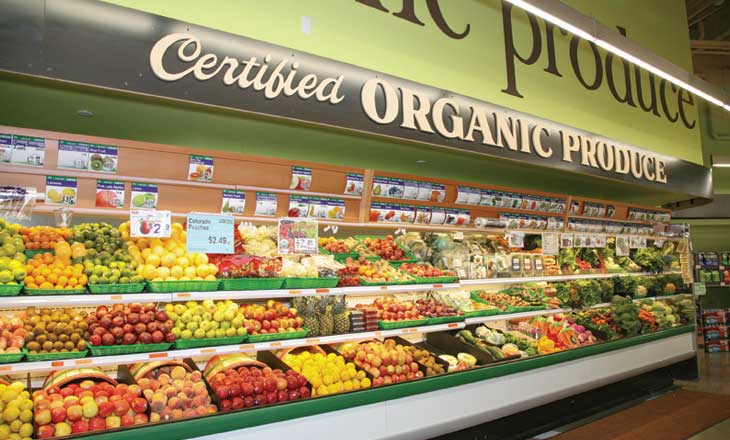
Lawrence supermarkets are greener than ever these days, thanks to environmentally minded renovations and projects. The Community Mercantile, Dillons, and Hy-Vee are investing heavily in the local market, while the opening of Natural Grocers in 2011 added more options to the mix.
All are striving to tap into fast-growing consumer demand for eco-friendly products and shopping experiences, but their goals are bigger than that. What’s good for the environment also benefits communities and boosts the bottom line, says Sheila Lowrie, a spokeswoman for Dillons, which is owned by the publicly traded Kroger Co.
“Because the margins are so razor thin, if you want to remain competitive, you have to find ways to reinvest in things that matter to customers,” Lowrie says.
Supermarket profit margins shrank to about 1% in 2012, largely due to rising wholesale food costs, according to financial information provider Sageworks. Passing those costs onto consumers is tricky, so stores are instead seeking ways to reduce expenses.
And when it comes to expenses, energy is a big target. Refrigeration and lighting account for more than half of total energy use in the average supermarket, and every dollar spent to reduce usage is equivalent to increasing sales by $59, according to Energy Star, a voluntary energy efficiency program sponsored by the U.S. Environmental Protection Agency.
Finding the best way to spend those dollars can be challenging, though. That’s why The Merc conducted an energy audit last year. The cooperative, which has more than 6,500 owner-members, discovered it could reduce energy consumption by 30 percent, with a seven-year payback on the investment. Implementing all the recommended changes at once would cost around $300,000, though.
So The Merc’s Green Team, which includes both owners and employees, is now reviewing the results and developing a methodical plan for upgrading the store’s heating and cooling, refrigeration and lighting systems.
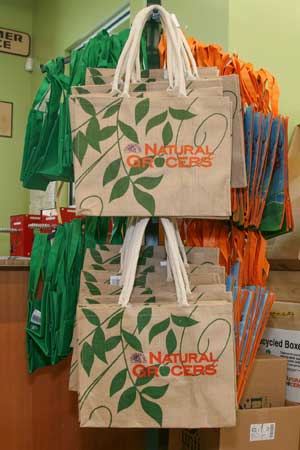 Improvements like weather stripping, caulking and installing strip curtains on walk-in freezer doors have already been finished. Thermostats will be upgraded, lighting reduced during off-hours and staff trained later this year. Bigger projects like replacing the electric furnaces and installing LED lighting in refrigerated cases are also planned.
Improvements like weather stripping, caulking and installing strip curtains on walk-in freezer doors have already been finished. Thermostats will be upgraded, lighting reduced during off-hours and staff trained later this year. Bigger projects like replacing the electric furnaces and installing LED lighting in refrigerated cases are also planned.
It’s all been a long time coming. The Merc began in 1974 as an organized buying club, and it over the years moved through several retail locations before settling into its current home at 9th and Iowa streets in 2001. In 2007, The Merc renovated the 18,000 square foot space, which had operated continuously as a grocery store since 1966.
Still, management was reluctant to invest too heavily in a structure it didn’t own. That changed last year, when The Merc purchased its building under a 10-year financing plan, says store operations manager Brian Phillips.
“We wanted to stay in this location for a very long time and wanted to be able to make those kinds of improvements to the building,” Phillips says.
The improvements aren’t just structural. The Merc continuously reviews the environmental impact of other practices and policies as well. Employees on its Environmental Team have spearheaded projects such as offering customers paper shopping bags or recycled boxes instead of plastic bags and encouraging them to bring reusable bags by offering a five-cent bag credit—a payout that added up to $11,689 in bag credits in 2012.
The Merc’s annual waste audit spurred improved recycling, and some 400 pounds of plastic, cardboard, metal and paper are now recycled daily. Another 150,000 pounds of waste is picked up by farmers to be composted or fed to livestock each year, Phillips says. The Merc has scaled back on plastic packaging used in its deli, meat and other services, and it enforces an anti-idling policy for delivery trucks with diesel engines.
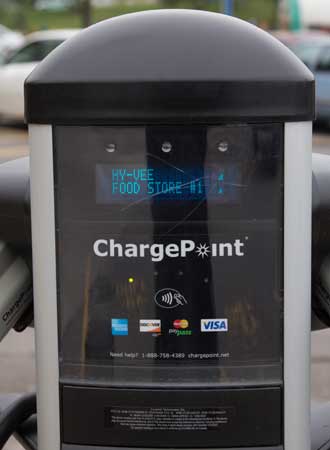 Meat and dairy products are antibiotic and hormone free, seafood is sustainably harvested, coffee is Fair Trade and organic and deli items are scratch-made. The Merc also adheres to a long list of banned ingredients such as artificial colors, parabens and high fructose corn syrup and emphasizes locally made and grown products.
Meat and dairy products are antibiotic and hormone free, seafood is sustainably harvested, coffee is Fair Trade and organic and deli items are scratch-made. The Merc also adheres to a long list of banned ingredients such as artificial colors, parabens and high fructose corn syrup and emphasizes locally made and grown products.
“From small decisions to big decisions, we consider the environmental impact in everything we do,” Phillips says. “It is baked into every fiber of our being, so it comes out in everything we do.”
The Merc’s single location means it can quickly institute small changes that have a big impact, such as identifying local products with shelf tags that include producer’s photos and their distance from the store.
Change is more challenging for a chain the size of Dillons, which operates 88 stores in Kansas, Missouri and Nebraska. That’s why Dillons, based in Hutchinson, recently launched a campaign designed to tell shoppers exactly how local their food is, says Lowrie.
Hutchinson dairies supply some 15 million gallons of milk annually to Dillons, and all of the company’s self-stable and organic milk is produced there as well, she says. Dillons’ eggs are also sourced in Hutchinson, its own-brand flour is milled near Wichita and scores of other products come from a 400-mile radius.
Working with local producers fits Dillons’ overall sustainability policy, which not only addresses the environment but also the economic and social needs of the communities in which it operates.
Take the amount of food that gets thrown away each year. Americans toss about 40% of their food each year, the National Resource Defense Council estimates. Grocery stores generate a portion of that, and Dillons is working to reduce its share. One strategy is to partner locally with Harvesters through the Feed America network to donate safe but unsalable perishable and non-perishable food to local food banks.
The Dillons at 17th and Massachusetts is also a pilot for composting and recycling programs company-wide, says Lowrie. Together, they divert 93 percent of the store’s waste from the landfill, earning it the zero waste designation under the EPA’s WasteWise guidelines, Lowrie says.
But that’s not all that’s happening at the location, which Dillons opened in 1960 and in 2012 demolished and rebuilt.
The new store now consumes 20 percent less energy, thanks in part to skylights, LED lighting and a slew of monitors and sensors that ensure the lights operate only as needed. The refrigeration system has state-of-the-art compressors, there’s a new fan system in the deli and 19 sensors that monitor and adjust energy consumption store-wide. There are low flow toilets and sinks in the bathrooms, drought-tolerant native plants outside, a new bulk food section and polished concrete floors throughout the store.
Dillons is also renovating its location at 6th Street and Lawrence Avenue, which opened in 1986 and was last updated in 1994. The company has no plans to remodel its 23rd Street and Naismith Drive store or the location at 6th Street and Wakarusa Drive.
All four of its local stores benefit from Kroger’s environmental policies, such as improving transportation logistics to reduce the number of trucks on the road, working with the World Wildlife Fund to support wild-caught fishery improvement projects and committed to purchasing 100 percent certified sustainable palm oil for use in its corporate brands by the end of 2015.
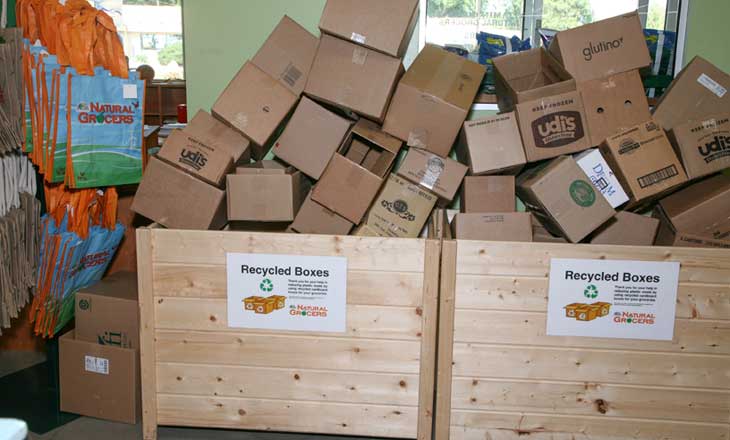
“We look for ways we can make a positive impact socially, on the environment and on the economy,” Lowrie says “We want to improve today so we can protect tomorrow.”
Hy-Vee shares that forward view. The Iowa-based, employee-owned company last year renovated and expanded its location at Clinton Parkway and South Kasold Drive; it also added a gas station and convenience store nearby.
Becoming more environmentally sustainable not only helps reduce operating costs, but also allows the company to lower prices and reinvest in the communities where it operates. That’s especially true in the face of rising energy costs, says Andrew Yochum, store director of the Hy-Vee at Clinton Parkway and South Kasold Drive
“There are certain things we want to do right,” Yochum says. “If you look to the future, in 10 years how important will this be to our customers but also how much more is energy going to cost?”
Hy-Vee upgraded its refrigeration system, installed LED lighting in the refrigerated cases, incorporated more ambient light near the front of the store and connected most of its lighting to sensors so lights turn themselves off when they’re not being used. Those and other changes meant that even 15,000 square feet of space was added during the renovation, for a total of 76,000 square feet, utility costs have remained the same.
“When you look at it that way, it does make sense to do the things we’re doing,” Yochum says.
Tile floors were replaced with polished concrete, which take no chemicals to maintain. There are electric car charging stations in the parking lot, and the store will soon launch a composting program that Yochum expects will divert as much as 60% of its waste from the landfill.
It’s always more challenging to renovate a building that must remain open during construction. That wasn’t a problem at Hy-Vee’s new gas station and convenience store just off Clinton Parkway, though.
The newly built structure, which Yochum also manages, incorporates structural brick design, a high-energy furnace, skylights, LED lighting wired to dimmers, concrete floors, solar panels, landscaping with native plants and a rainwater collection system that can be used to flush the toilets.
Not that you’d notice most of that, says Yochum, who expects the site to become LEED (Leadership in Energy & Environmental Design) certified.
“Everything flows so seamlessly that you don’t know there’s anything special about it,” he says. “It looks like a conventional building, it acts like a conventional building, it just doesn’t use the energy or have the waste.”
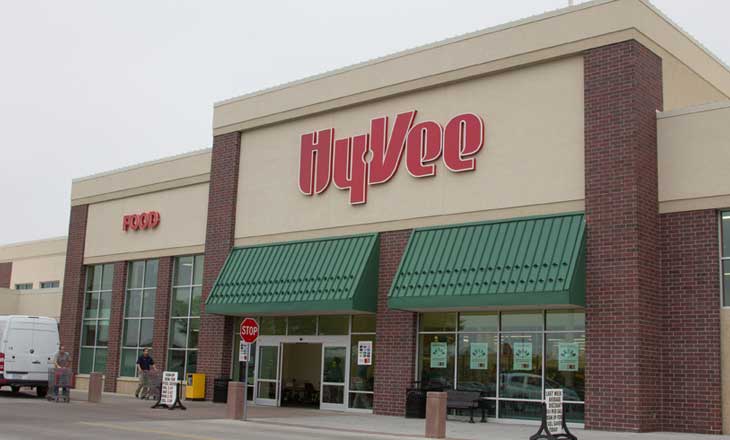
Hy-Vee doesn’t plan to renovate its store at 6th Street and South Monterey Way; the store instead is focusing on other green policies. It recycles plastic shopping bags, as well as cardboard, other plastics, light bulbs and even grease. The store’s looking to divert even more waste and may soon begin composting, says store director Andy Sutton.
The company’s also taking bids on installing LED lights, and it continues expanding the range of local and organic products offered. All that helps keep Hy-Vee competitive, but there’s more to the philosophy than that, Sutton says.
“If it’s right for our community, right for our store and right for our world, Hy-Vee makes the right decision,” he says.
Natural Grocers, which opened at 23rd Street and Naismith Drive in 2011, is also all about making the right decisions.
“It’s imperative that we are sustainable,” says store manager Colby Carter. “We need to return a balance to the ecosystem and provide for future generations.”
The store doesn’t provide shopping bags; customers instead bring their own or use one of the recycled boxes in a bin near the front door. All of the store’s produce is certified organic, and it’s working to bring in more locally made and grown products. Meat, poultry and eggs are naturally produced according to the company’s own standards, and fish is sustainably wild-caught.
Natural Grocers also has an extensive selection of bulk products that are prepackaged at a central warehouse and shipped to each store. That cuts down on on-site management, waste and packaging, Carter says. Employees recycle cardboard, paper, plastic and other waste, and the building’s design incorporates green lighting, heating and other technologies.
When you’re shopping at a health food store, it’s only natural to assume they are doing their part for saving the environment and reducing their footprint, Carter says.■
